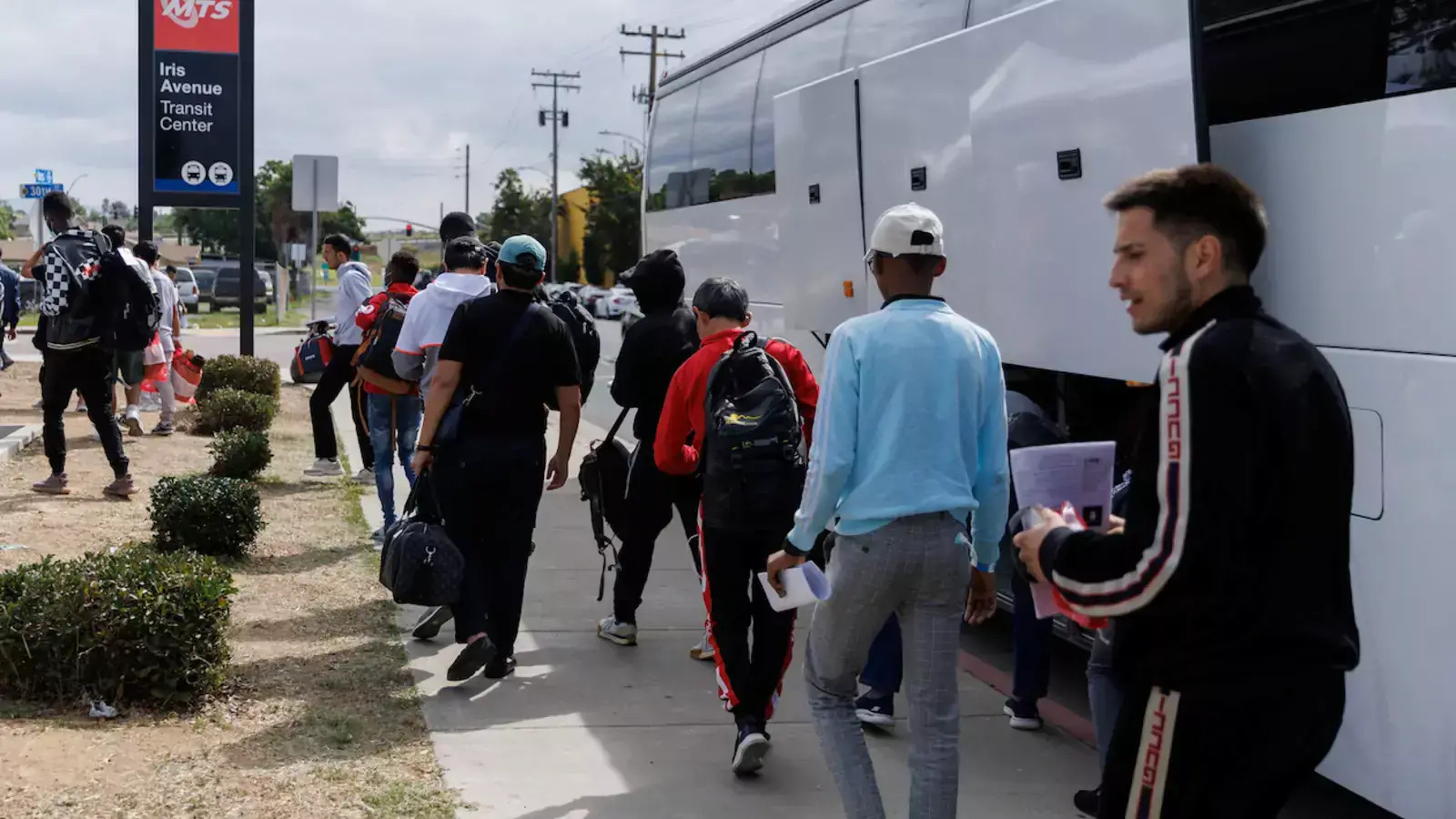Border Patrol Releases Hundreds Of Migrants At San Diego Bus Stop
In a startling turn of events on Friday, Border Patrol releases hundreds of migrants at San Diego bus stop instead of at a reception center, a consequence of the center running out of local funding sooner than anticipated.
Author:Suleman ShahReviewer:Han JuFeb 26, 202427.6K Shares657.5K Views

In a startling turn of events on Friday, Border Patrol releases hundreds of migrants at San Diegobus stop instead of at a reception center, a consequence of the center running out of local funding sooner than anticipated.
Previously, migrants had access to a reception center providing essential services like charging stations, bathrooms, meals, and assistance in planning their journeys within the U.S. However, due to the funding shortfall, these individuals were left on the streets, prompting migrant aid groups to scramble and improvise makeshift arrangements to provide assistance.
Border Patrol buses arrived with migrants hailing from various countries such as Senegal, China, Ecuador, and Rwanda. Aid groups mobilized to shuttle them to a parking lot where they could charge phones and arrange transportation to the airport. The majority aimed to spend only a few hours in San Diego before continuing their journey.
Gabriel Guzman, a 30-year-old painter from the Dominican Republic, expressed confusion, "Are we in San Diego?" He had crossed the border in remote mountains and was released with a court appearance scheduled in Boston.
The situation unfolded as volunteers navigated language barriers, providing instructions in English, Spanish, French, and using translation apps for other languages. The scene included diverse individuals like Abd Boudeah, a former molecular engineering student from Mauritania, who fled persecution for being gay, hoping to settle in Chicago.
Despite efforts, the transit center parking lot was full, leaving migrants with nowhere to stand, and public bathrooms were nonexistent. Financial constraints led to the closure of the reception center, as San Diego County assessed damages from January flooding and addressed homelessness and healthcare issues.
The nonprofit SBCS, which operated the reception center, received $6 million from the county since October. However, it reported monthly costs of $1.4 million, leading to stretched funds. While migrant advocacy groups criticized the organization, the county emphasized the need for financial prudence amid multiple challenges.
San Diego, like other border cities, faces difficulties accommodating migrants without compromising essential services. The county board of supervisors, led by Nora Vargas, acknowledged the necessity of the migrant welcome center but cited the need to evaluate overall priorities in the face of pressing local issues.
The incident in San Diego is part of a broader challenge faced by local governments nationwide, including New York, Chicago, and Denver. The Border Patrol emphasized the urgent need for Congress to provide additional resources and legislative action to address outdated immigration laws.
As the immigration debate continues, aid groups grapple with providing critical support to new arrivals while facing legal threats. Texas Attorney General Ken Paxton recently threatened to sue and shut down Annunciation House in El Paso, accusing the organization of facilitating illegal entry.
Final Thoughts
The Border Patrol releases hundreds of migrants at San Diego bus stop because there are a lot of new people coming to the busy border area at the same time that California Gov. Gavin Newsom is meeting President Biden at the White House.
The Border Patrol bus let the migrants out into the streets of San Ysidro, where they were given to a non-governmental group that could help them. After that, they will continue to their end destination. People from India, Senegal, the Dominican Republic, and Ecuador were among the migrants. Some of the places they were going were New York, Chicago, Atlanta, and New Jersey.
Jump to

Suleman Shah
Author
Suleman Shah is a researcher and freelance writer. As a researcher, he has worked with MNS University of Agriculture, Multan (Pakistan) and Texas A & M University (USA). He regularly writes science articles and blogs for science news website immersse.com and open access publishers OA Publishing London and Scientific Times. He loves to keep himself updated on scientific developments and convert these developments into everyday language to update the readers about the developments in the scientific era. His primary research focus is Plant sciences, and he contributed to this field by publishing his research in scientific journals and presenting his work at many Conferences.
Shah graduated from the University of Agriculture Faisalabad (Pakistan) and started his professional carrier with Jaffer Agro Services and later with the Agriculture Department of the Government of Pakistan. His research interest compelled and attracted him to proceed with his carrier in Plant sciences research. So, he started his Ph.D. in Soil Science at MNS University of Agriculture Multan (Pakistan). Later, he started working as a visiting scholar with Texas A&M University (USA).
Shah’s experience with big Open Excess publishers like Springers, Frontiers, MDPI, etc., testified to his belief in Open Access as a barrier-removing mechanism between researchers and the readers of their research. Shah believes that Open Access is revolutionizing the publication process and benefitting research in all fields.

Han Ju
Reviewer
Hello! I'm Han Ju, the heart behind World Wide Journals. My life is a unique tapestry woven from the threads of news, spirituality, and science, enriched by melodies from my guitar. Raised amidst tales of the ancient and the arcane, I developed a keen eye for the stories that truly matter. Through my work, I seek to bridge the seen with the unseen, marrying the rigor of science with the depth of spirituality.
Each article at World Wide Journals is a piece of this ongoing quest, blending analysis with personal reflection. Whether exploring quantum frontiers or strumming chords under the stars, my aim is to inspire and provoke thought, inviting you into a world where every discovery is a note in the grand symphony of existence.
Welcome aboard this journey of insight and exploration, where curiosity leads and music guides.
Latest Articles
Popular Articles